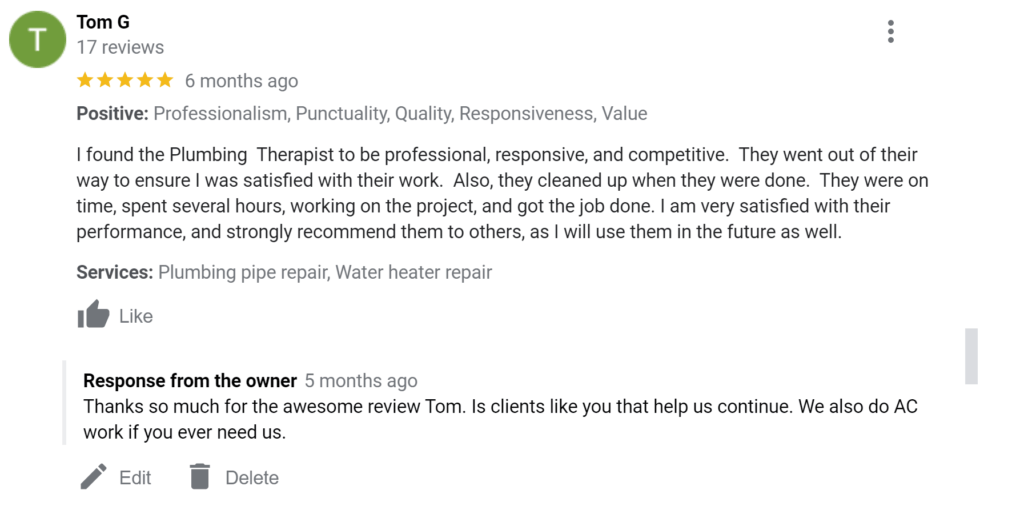Dishwasher Repair
Reliable dishwasher repair in Tampa Bay by Plumbing Therapist. Quick service, lasting solutions. Call us for hassle-free appliance maintenance and peace of mind.
Do You Need Our Help ?
Feel free to contact us now
$99 Water Heater Flush + Free Plumbing System Inspection
Dishwasher Repair in Tampa Bay
Comprehensive Dishwasher Repair Services in Hillsborough County, Pinellas County, and Pasco County
Don’t Let Dishwasher Problems Disrupt Your Routine
At Plumbing Therapist, we understand that a malfunctioning dishwasher is more than just an inconvenience, it’s a disruption to your daily life. That’s why our team of skilled plumbing professionals in Tampa Bay is dedicated to providing prompt, efficient dishwasher repair services to get your appliance back in top shape as quickly as possible.
Common Issues We Handle:
- Leaks: From door seals to pump assemblies, we tackle the source of leaks for a watertight fix.
- Clogs: We clear blockages in filters, hoses, and pipes to restore proper drainage.
- Noises: If your dishwasher is making unusual sounds, we’ll diagnose and remedy the cause.
- Performance: We fix issues with dish racks, spray arms, and more to ensure a thorough clean.
- Electrical Problems: Our technicians safely repair wiring and controls for optimal operation.
Why Choose Plumbing Therapist?
- Expert Technicians: Our team is equipped with the knowledge and tools to repair all major dishwasher brands.
- Fast Response: We offer timely service calls to address your repair needs without delay.
- Quality Parts: We use high-quality replacement parts to ensure lasting repairs.
- Transparent Pricing: Receive a clear, upfront estimate before any work begins—no surprises.
- Guaranteed Workmanship: We stand behind our repairs with a satisfaction guarantee.
Schedule Your Dishwasher Repair Today
Don’t let a broken dishwasher throw off your day. Contact Plumbing Therapist for reliable repair services in Tampa Bay. Schedule your service visit online or call us directly to get started. Our friendly staff is ready to answer any questions and provide the professional assistance you need.
Your Trusted Partner for a Harmonious Home
Plumbing Therapist is more than just a service provider, we’re your partner in maintaining a harmonious home. From dishwasher repair to comprehensive plumbing solutions, we’re here to ensure your home runs smoothly. Trust us to handle your plumbing needs with the care and expertise you deserve.

Why partner with Plumbing Therapist?
Quality, Affordability, and Expertise.

No Hidden or Unexpected Charges

Free Estimates & Online Booking Available

Professionally Trained Technicians

Honesty is Guaranteed

Quick Communication & Service Within 24 Hours

400+ 5 Star Reviews

Why is it necessary to repair the dishwasher?
Repairing a dishwasher is necessary for several reasons:
Efficiency: A well-functioning dishwasher is more efficient in terms of water and energy use, saving on utility bills and conserving resources.
Performance: Repairing a dishwasher ensures that it cleans dishes effectively, reducing the need for rewashing which can be time-consuming and wasteful.
Prevent Water Damage: Leaks from a faulty dishwasher can lead to water damage in your home, potentially affecting cabinetry, flooring, and leading to mold growth.
Longevity: Regular maintenance and timely repairs can extend the life of your dishwasher, preventing the need for an early replacement.
Safety: A malfunctioning dishwasher can pose electrical risks or become a fire hazard if not properly serviced.
Cost Savings: Addressing minor repairs promptly can prevent more significant, costly issues from developing.
Convenience: The dishwasher is a significant convenience in modern homes; repairing it ensures that you maintain the convenience of not having to wash dishes by hand.
Home Value: Well-maintained appliances can contribute to the overall value of your home, which is important if you plan to sell in the future.
In summary, repairing a dishwasher is essential for maintaining its efficiency, performance, and safety, while also preventing costly damages and preserving the convenience and value it adds to your home.
If you would like more information, feel free to give them a call at (813)-437-4477 or you can book online and get their latest discount!
Customer Testimonials: Real Experiences with Plumbing Therapist
We proudly share the experiences and stories of our valued clients. Their feedback provides a glimpse into the quality of service and commitment to excellence we uphold at Plumbing Therapist. You'll read firsthand how our plumbing solutions have improved comfort and efficiency in homes across Tampa Bay. These testimonials illustrate our dedication to customer satisfaction and the difference our expert services can make.




Your questions answered
Common Dishwasher Repair Questions:
Why is my dishwasher not starting?
If your dishwasher is not starting, there could be several potential reasons. Here’s a checklist of common issues to investigate:
Power Supply: Ensure that the dishwasher is properly plugged in and that the outlet is functioning. Check your home’s electrical panel for any tripped breakers or blown fuses.
Door Latch: The dishwasher door must be securely closed for the appliance to start. If the latch is broken or not engaging properly, the dishwasher will not operate.
Control Panel: If the control panel or touchpad is unresponsive, it may be faulty or require a reset. Sometimes, holding down a specific button for a few seconds can reset the control board.
Child Lock: Some dishwashers have a child lock feature to prevent unintended use. Make sure it hasn’t been activated.
Timer or Electronic Control: A malfunction in the timer or electronic control can prevent the dishwasher from starting. This may require professional diagnosis and replacement.
Thermal Fuse: If the dishwasher has a thermal fuse and it’s blown, the dishwasher won’t start. This safety device prevents overheating and will need replacement.
Water Supply: Check if the water supply valve, usually located under the sink, is turned on. Without water, the dishwasher won’t start its cycle.
Door Switch: The door switch prevents the dishwasher from running while the door is open. If it’s defective, it might not signal the dishwasher to start.
Motor: If the motor is seized or has failed, the dishwasher will not start. You might hear a humming sound if the motor is stuck.
Start Relay: The start relay on the motor can also fail, preventing the dishwasher from starting.
User Settings: Review the selected wash settings. Some dishwashers won’t start under certain conditions, like setting a delayed start.
If you’ve checked these common issues and the dishwasher still won’t start, it may be time to call a professional technician from Plumbing Therapist for a detailed diagnosis and repair. Dishwasher repairs can involve complex electrical components and should be handled with care to ensure safety and prevent further damage to the appliance.
Why isn't my dishwasher cleaning dishes properly?
If your dishwasher isn’t cleaning dishes properly, there are several potential issues to consider:
Spray Arm Issues: Check if the spray arms are moving freely and are not clogged with food particles or scale buildup. They should also be properly attached and not damaged.
Filter and Drain Clogs: A clogged filter can restrict water flow, reducing cleaning power. Clean the filter regularly according to the manufacturer’s instructions. Also, check the drain area and remove any debris that could be causing a blockage.
Water Temperature: For optimal cleaning, the water entering the dishwasher should be at least 120°F (49°C). If the water isn’t hot enough, it won’t clean as effectively.
Detergent Issues: Using too much, too little, or old and ineffective detergent can result in poorly cleaned dishes. Also, make sure to use a detergent that is specifically designed for dishwashers.
Dish Loading: Overloading the dishwasher or blocking the spray arms with large items can prevent water from reaching all the dishes. Ensure that dishes are loaded according to the manufacturer’s guidelines.
Hard Water: Hard water can leave a residue on dishes. Consider using a rinse aid or a water softener to combat this.
Dishwasher Age: Older dishwashers may not clean as effectively as newer models due to wear and tear on components like the wash pump or spray arms.
Wash Cycle Selection: Make sure you’re using the appropriate cycle for the type of dishes you’re washing. Heavily soiled items may require a more intensive cleaning cycle.
Water Inlet Valve: If the water inlet valve is partially blocked or not opening fully, the dishwasher may not be getting enough water to clean dishes properly.
Rinse Aid Dispenser: Check if the rinse aid dispenser is empty or not functioning properly, as rinse aid helps with drying and preventing spots on dishes.
Heating Element: If the heating element is malfunctioning, the dishwasher won’t be able to heat the water to the proper temperature for cleaning and drying.
Food Disposer: Some dishwashers have a built-in food disposer. If it’s not working correctly, it can leave food residue on dishes.
If you’ve addressed these common issues and your dishwasher still isn’t cleaning properly, it may be time to consult with a professional. A technician from Plumbing Therapist can help diagnose and fix more complex problems that might be affecting your dishwasher’s performance.
Why is my dishwasher leaking water?
A dishwasher that’s leaking water can be caused by several issues, and identifying the source of the leak is crucial for determining the appropriate fix. Here are some common reasons why your dishwasher might be leaking:
Door Seal (Gasket): Over time, the rubber seal around the dishwasher door can become brittle, crack, or lose its shape, leading to leaks. Inspect the gasket for any signs of wear and replace it if necessary.
Loose or Damaged Hoses: The hoses that connect the dishwasher to the water supply or drain can become loose or damaged. Check for any signs of leakage at the connections and ensure they are secure. Replace any damaged hoses.
Pump Seals: If the dishwasher’s pump seals are worn out, water may leak during operation. These seals are part of the pump assembly and may require a professional to replace them.
Water Inlet Valve: The valve that controls the flow of water into the dishwasher can fail, causing a leak. If the valve is defective, it will need to be replaced.
Spray Arm: Cracks or splits in the spray arm can cause water to spray directly against the door seal, leading to leaks. Inspect the spray arms for any damage and replace them if needed.
Detergent: Using the wrong type or too much detergent can create excessive suds, which can lead to leaks. Ensure you’re using the correct detergent and amount recommended for your dishwasher.
Dishwasher Tub: A hole or crack in the dishwasher tub can lead to leaks. This can be a more serious problem and might require the replacement of the dishwasher if it’s not repairable.
Float Switch: The float switch regulates the water level in the dishwasher. If it’s stuck or malfunctioning, it could allow too much water into the machine, resulting in a leak.
Door Latch: If the door latch is not properly secured, the door may not seal correctly, leading to leaks during operation.
Improper Alignment: If the dishwasher isn’t level, it can cause water to pool and leak out. Ensure that the dishwasher is properly aligned and level.
Overfilling: If the dishwasher is overfilled with water, it can leak. This could be due to a malfunctioning water inlet valve or float switch.
If you’re experiencing a leak and can’t easily identify the source, it’s advisable to contact a professional technician from Plumbing Therapist to diagnose and repair the issue. Dishwasher leaks can lead to more significant problems, such as water damage to your home, so it’s important to address them promptly.
Why won't my dishwasher drain?
If your dishwasher isn’t draining properly, there are several potential reasons why this might be happening. Here are some common causes to investigate:
Clogged Drain Hose: The hose that carries water from the dishwasher to the drain can become clogged with food particles or grease. Check for kinks or blockages and clean it out as necessary.
Check Valve: Some dishwashers have a check valve on the drain hose that prevents water from returning to the dishwasher. If this valve is stuck, it could prevent the dishwasher from draining.
Garbage Disposal Issues: If your dishwasher drains through the garbage disposal, make sure the disposal is clear of debris and that the knockout plug has been removed during installation.
Air Gap Blockage: If your sink has an air gap, it can become clogged with debris, causing a blockage in the drainage system. Clean the air gap to ensure proper drainage.
Drain Pump Failure: The drain pump uses an impeller to force water through the drain hose. If the pump is malfunctioning or the impeller is damaged, it might need to be repaired or replaced.
Drain Basket and Filter: The drain basket and filter can become clogged with food scraps and debris. Regular cleaning is necessary to maintain proper drainage.
High-Loop or Air Gap Installation: The drain hose should either be looped up high beneath the countertop or connected through an air gap to prevent backflow. Ensure this is installed correctly.
Drain Solenoid Kit: Some dishwashers use a solenoid kit to open the drain valve. If this solenoid fails, the valve might not open for the dishwasher to drain.
Timer or Control Board: The timer or control board regulates the duration of the drain cycle. If either is defective, it may not signal the dishwasher to drain.
Drain Valve: The drain valve can get stuck closed, preventing water from leaving the dishwasher. This may require replacement.
Sump: The sump in the bottom of the dishwasher could be clogged with debris, preventing water from reaching the pump.
If you’ve checked these areas and the problem persists, it may be time to call in a professional. A technician from Plumbing Therapist can provide a thorough diagnosis and resolve the issue, ensuring your dishwasher drains correctly and continues to operate efficiently.
Is it worth repairing my dishwasher or should I replace it?
Deciding whether to repair or replace a dishwasher depends on several factors:
Age of the Dishwasher: If your dishwasher is older than 9 or 10 years, it might be nearing the end of its typical lifespan. Newer models are more energy-efficient and may offer better performance and features.
Cost of Repairs: A good rule of thumb is that if the cost of repair is more than 50% of the cost of a new dishwasher, it’s generally better to replace it.
Extent of the Problem: Minor issues like a clogged filter or a broken dish rack are usually worth fixing. However, if the dishwasher has a major problem like a faulty motor or a cracked tub, it might be more cost-effective to replace it.
Energy Efficiency: Newer models are more energy-efficient and can save you money on your utility bills over time. If your current dishwasher is an older, less efficient model, upgrading could be a good investment.
Performance: If your dishwasher isn’t cleaning well, even after repairs, it might be time for an upgrade.
Warranty: If your dishwasher is still under warranty, repairing it could be the most economical choice.
Integration with Your Kitchen: If your dishwasher is built into your kitchen cabinetry, replacing it with a new model of the same size and style might be important for maintaining the aesthetics and functionality of your kitchen space.
Environmental Considerations: Repairing an appliance is often the more environmentally friendly option since it keeps the item out of the landfill and requires fewer resources than manufacturing a new one.
Before making a decision, it might be helpful to get a professional opinion on the state of your current dishwasher. A technician from Plumbing Therapist can assess the condition and advise you on the cost-effectiveness of a repair versus a replacement. They can also provide insights into the potential future performance and longevity of your appliance, helping you make an informed decision.
How long should a dishwasher last?
The lifespan of a dishwasher typically ranges from about 7 to 12 years, with the average being around 9 to 10 years. However, the actual lifespan can vary based on several factors:
Brand and Model: Some brands and models are known for their durability and may last longer than the average.
Usage Frequency: Dishwashers that are run once a day may wear out faster than those used less frequently.
Maintenance: Regular maintenance, such as cleaning filters and spray arms, can extend the life of a dishwasher.
Water Quality: Hard water can lead to mineral buildup and may reduce the lifespan of a dishwasher.
Type of Detergent: Using the correct type and amount of detergent can prevent damage to the dishwasher’s components.
Installation: Proper installation is crucial to ensure that the dishwasher operates as intended.
Repairs: Timely repairs of any issues can prevent small problems from becoming big ones that might shorten the dishwasher’s lifespan.
To maximize the lifespan of your dishwasher, follow the manufacturer’s guidelines for use and maintenance, and address any repairs promptly. If you’re experiencing issues with your dishwasher, a professional from Plumbing Therapist can help determine whether it’s best to repair or replace the unit based on its condition and performance.
